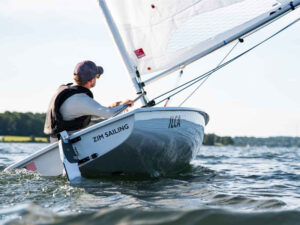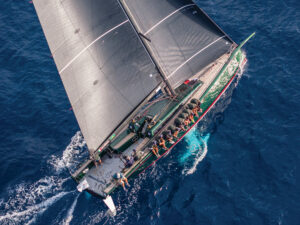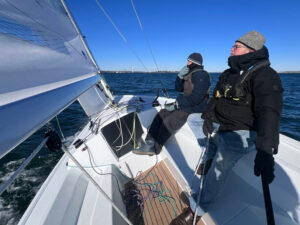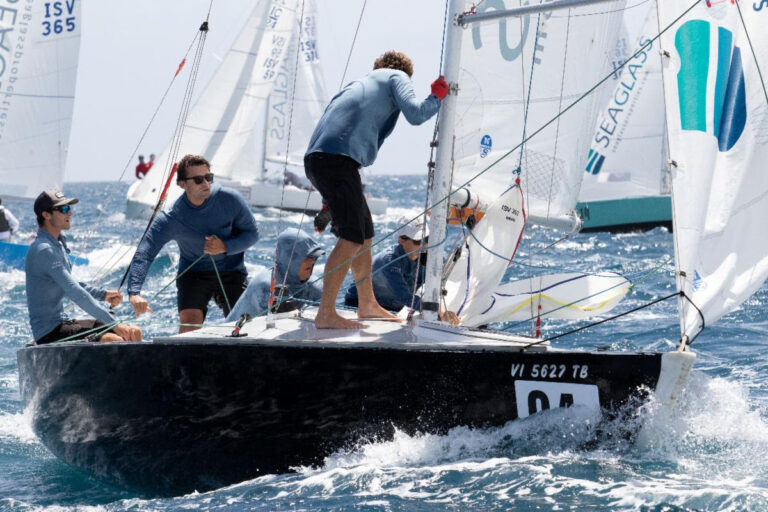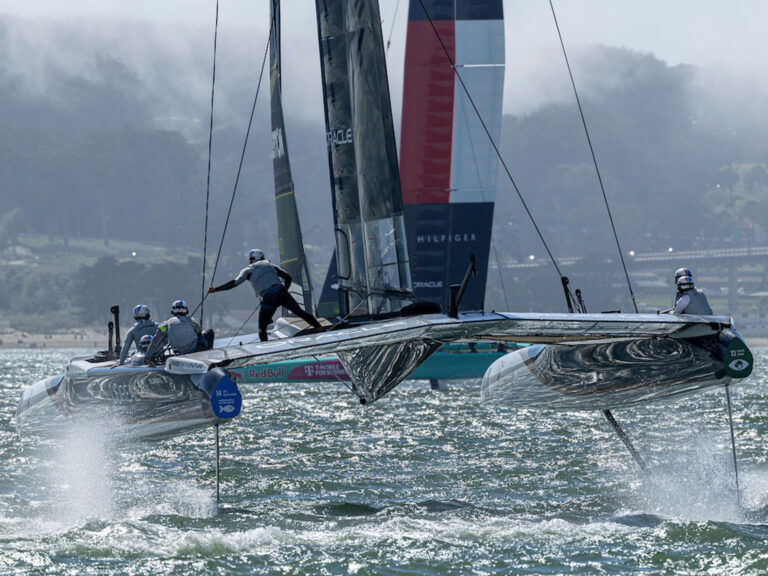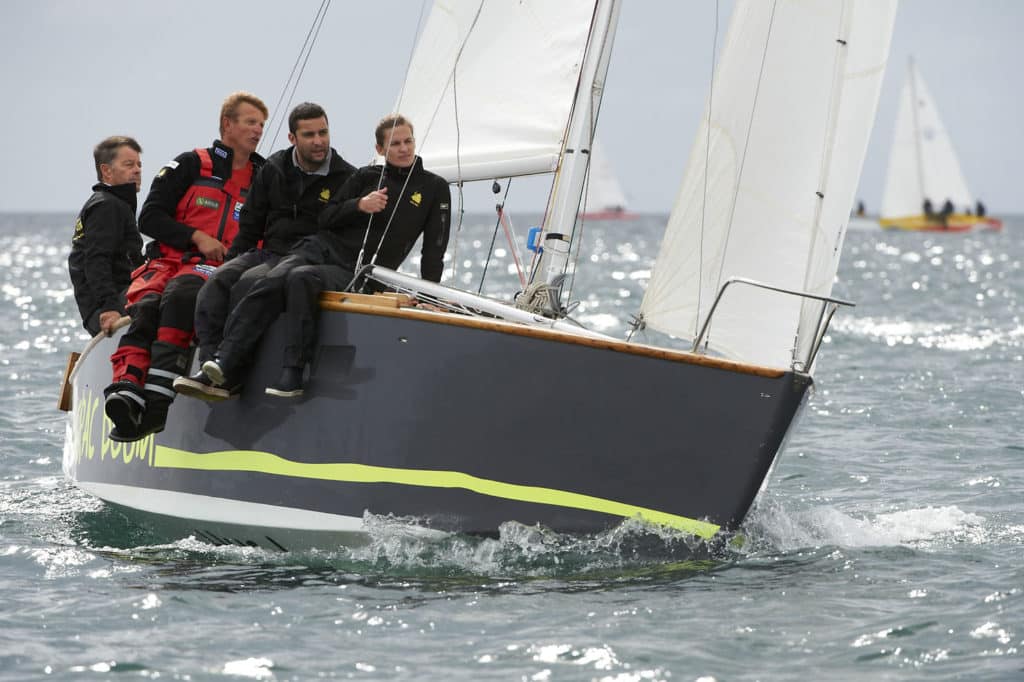
Jean-Pierre Dick sailing photo
Muscadet is known as a fine wine around the world, but in France, a Muscadet is also a boat design that continues to inspire fierce loyalty among its owners in the racing and cruising circuit.
Even though production of Muscadets stopped in 1979, the owners have a lot to say about why they remain so attached to a boat that got its name from a famous wine. For one, they say the simplicity of the 6.4-meter design is conducive to learning to sail. Its sturdiness kept it from breaking up in the middle of the Atlantic as one of the more reliable designs for Mini Transats a few decades ago. A Muscadet is largely made of wood, so repairing a hole after a collision is just a matter of replacing a plywood plank, which most boat owners can do themselves.
Two-time Vendée Globe winner Michel Desjoyeaux, aka “Le Professeur,” recently told the Muscadet Owners Association (Association des Proprietaires de Muscadet): “Why design something complicated when you can do something simple? If the Muscadet did not exist, then it would be necessary for someone to invent it.”
Given the Muscadet’s notoriety in France, it was hardly surprising that regatta organizers had no trouble attracting almost 100 boats to take part in the Regate des 50 Ans du Muscadet at the Brittany port city of Lorient in September.
To help celebrate the event, the race organizers invited some of France’s most well-known names in racing to participate, including Christophe Auguin, Yves Le Blevec, Arnaud Boissiere, Laurent Cordelle, Louis Burton, Jean-Pierre Dick, Alain Gautier, Roland Jourdain, Lionel Lemonchois, and Jean-Luc Van Den Heede.
But having a sailing celebrity onboard certainly did not guarantee that your boat would win. In fact, none of the well-known sailors mentioned above were on the boats that finished in the top five.
Damian Foxall, who played a key role in Groupama’s victory last year in the Volvo Ocean Race, was the racing standout on Flux Tendu. With crew Luke Berry, Camille Louvigne, and Yannis Troalen, Flux Tendu finished 35th overall, but did better during the second day of the regatta when it finished third during the last race. “Even though it was hard in the beginning, we showed that we had good potential,” said St. Malo-based Berry, who has completed three Fastnet races and is a Mini Class sailor.
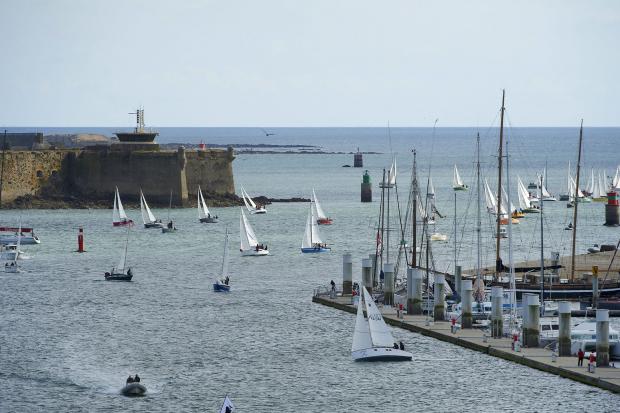
More than 95 teams taking part in the regatta head back to the Lorient port for a glass of Muscadet. Photo: Yvan Zedda
Despite the festive atmosphere of the event, all of the crews took the races very seriously and were just as competitive as they would be in any other regatta, Berry said. Still, despite the high-charged atmosphere on the water, Foxall remained cool and calm throughout, Berry said.
“It must have been difficult for Foxall since he is used to sailing 30 knots, and we were doing 4-5 knots most of the time,” Berry said, laughing. “And I don’t how much of a preparation it was for him before sailing on a 70-foot MOD70 in the upcoming Jacque Vabres transat.”
Triple Buse, crewed by Benoit Chauchat, Henri Kerloc’h, Michel Sacaze, and Christian Ponthieu were able to squeak by with the best average overall time. The crew, like the rest of the teams, had to make due with weak winds of less than 10 knots for much of the weekend, although there were some gusts up to 15 or so knots during the first day of the regatta.
The weather was warm and sunny for most of the weekend, and as an added bonus, there was more than enough Muscadet available for those who appreciated the famous wine. The wine is dry and goes well with oysters and shellfish. It was a welcome addition to the regatta. The race organizers also made sure that the participants’ glasses remained filled throughout the weekend.
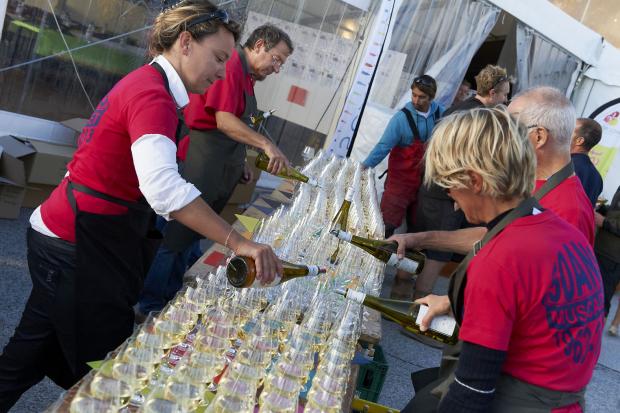
The famous wine flowed freely in celebration of its namesake’s 50th anniversary as a boat design. Photo: Yvan Zedda
While the organizers of the Regate des 50 Ans du Muscadet focused on commemorating the Muscadet’s half century of existence, the design also has a bright future, Jean Cordier, president of the Muscadet Association, said. A beginning sailor can start sailing one by buying a second-hand Muscadet in France for 5000 euros ($6,750), and for 10,000 ($13,500) to 15,000 euros ($20,250) more, you can refurbish it, add new sails, and buy a trailer, he said.
“The Muscadet is something you can learn on and then later give to your children so they can learn to sail. It’s a boat that you can hitch to your car and drive to a race event,” Cordier said. “When the boat is broken, you can easily fix it yourself because maintenance is easy. For a low budget, you can have a lot of fun.”

